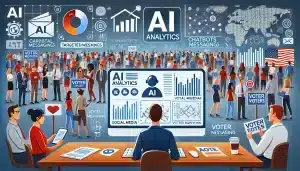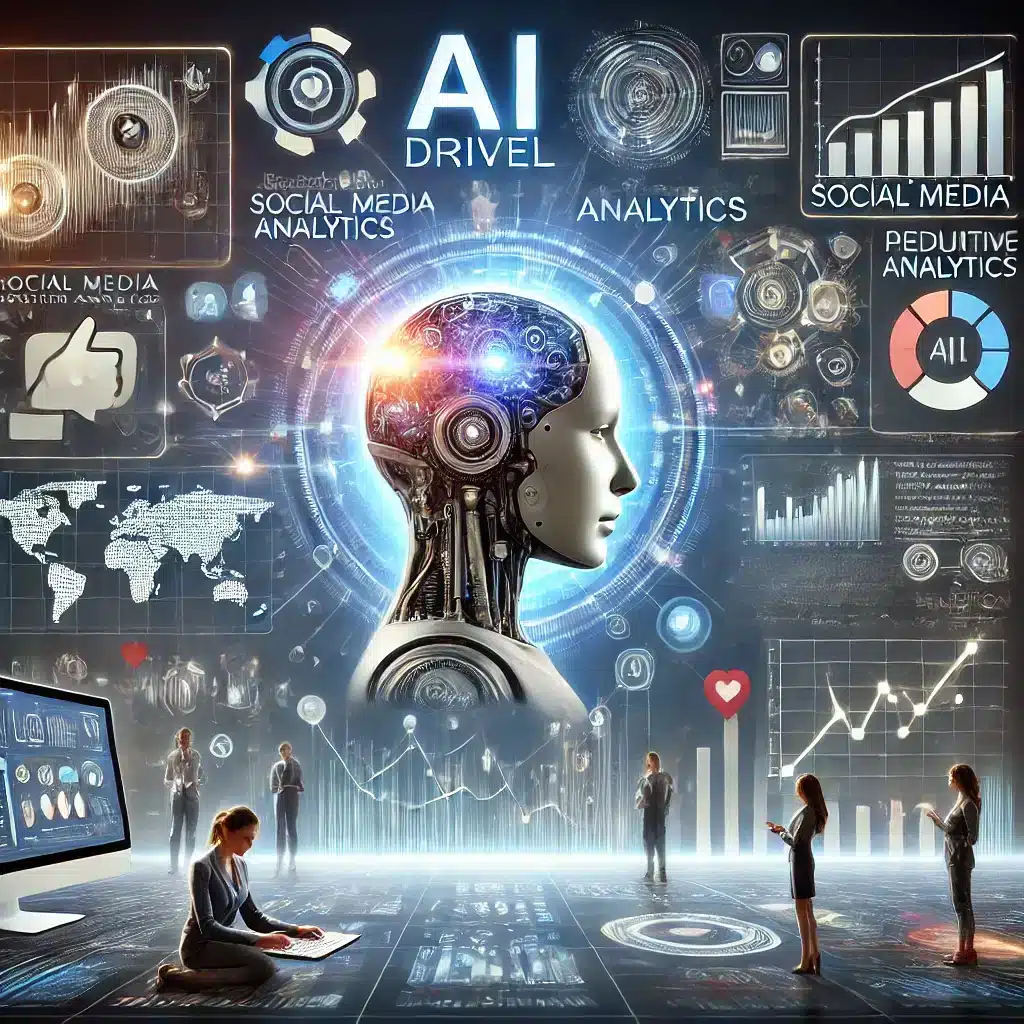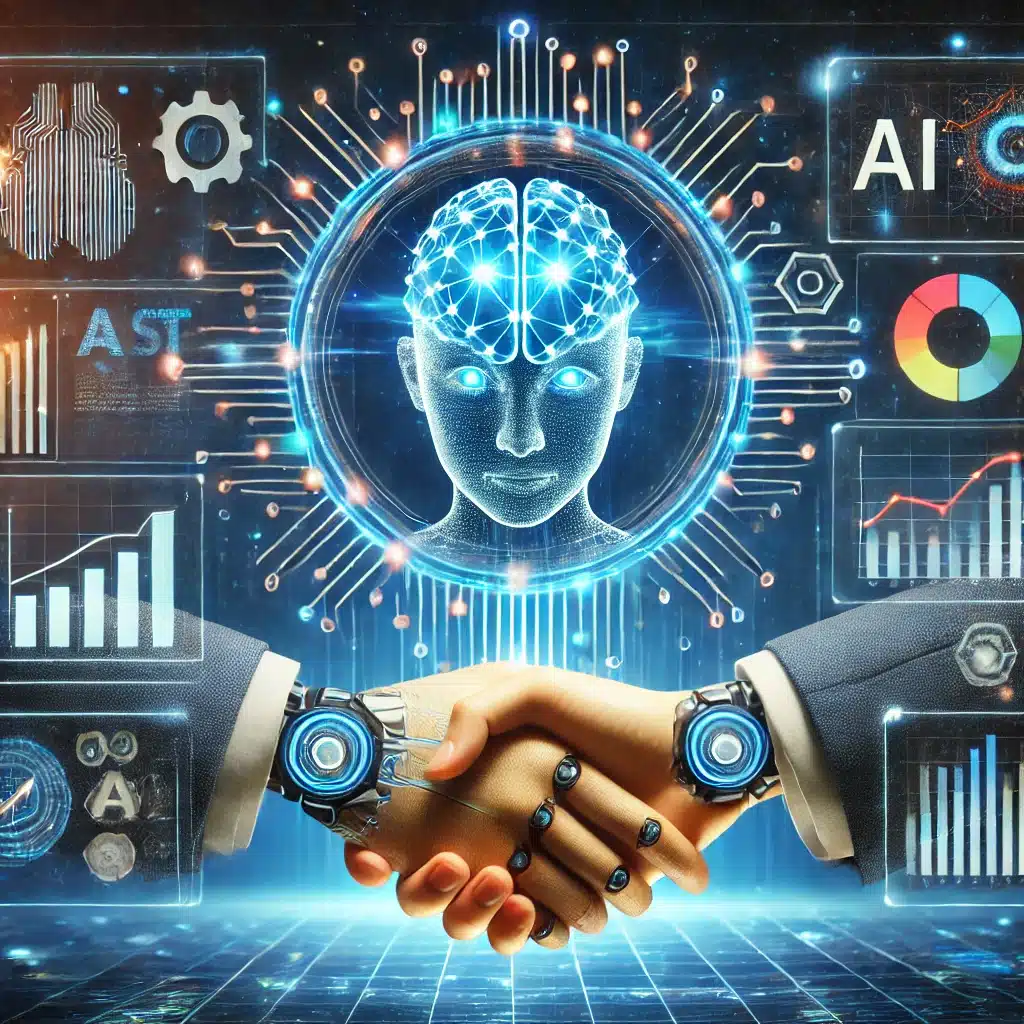In the ever-evolving realm of modern political campaigns, technology has emerged as a critical force shaping strategies and outcomes. Among the most transformative advancements is the integration of artificial intelligence (AI). AI has redefined how political campaigns are planned, executed, and managed, enabling campaign teams to gain deeper insights into voter behavior, streamline operations, and engage with audiences more effectively than ever before.
However, while the benefits of AI in political campaigns are undeniable, this technological shift also brings ethical and regulatory challenges. Issues surrounding data privacy, misinformation, and algorithmic bias necessitate a thoughtful and balanced approach to AI integration. This article explores how AI is revolutionizing political campaigns, highlighting its applications in voter engagement, analytics, content creation, and campaign management. Additionally, it delves into the ethical considerations and future prospects of leveraging AI in the dynamic world of modern politics.
The Growing Influence of AI in Moder Campaigns
Modern political campaigns have undergone a dramatic transformation with the advent of artificial intelligence (AI). By leveraging AI, campaign managers can gather and analyze data at unprecedented scales, offering insights into voter behavior, preferences, and sentiments. This has enabled campaigns to become more targeted, personalized, and efficient, fundamentally changing the political landscape. AI’s role extends beyond simple data analysis, touching on every aspect of campaign management, from resource allocation to voter engagement.
Enhancing Voter Engagement with AI
One of the most significant contributions of AI to political campaigns is its ability to enhance voter engagement. They identify trends and voter interests. For example, machine learning algorithms can predict which issues resonate most with specific demographics. Similarly, chatbots offer real-time interaction with voters. They provide information and answer questions instantly.
- Chatbots for Real-Time Interaction: AI-powered chatbots provide voters with instant responses to their inquiries. These tools can answer questions about campaign policies, share event details, and even address voter concerns in real-time. By maintaining constant communication, chatbots help campaigns build stronger connections with their audience.
- Predictive Analytics: Machine learning algorithms analyze historical data to predict which issues matter most to various voter groups. For instance, younger voters might prioritize climate change, while older demographics might focus on healthcare and pensions. Armed with these insights, campaigns can tailor their messaging strategies to address these specific concerns effectively.
- Social Media Sentiment Analysis: AI algorithms scour social media platforms to gauge public opinion. By understanding the sentiment surrounding a particular issue or candidate, campaigns can adjust their strategies dynamically, ensuring they remain relevant and impactful.
AI-Powered Modern Campaign Analytics
AI has revolutionized the way modern campaigns handle data. With the sheer volume of information available today, manual processing is no longer feasible. AI steps in to analyze this data at lightning speed, delivering actionable insights. According to Business Insider, technological interventions are becoming critical in various sectors, including politics.
- Detecting Trends and Patterns: AI can identify emerging trends by analyzing search queries, social media activity, and public discourse. This enables campaigns to anticipate voter needs and concerns before they become mainstream issues.
- Countering Misinformation: AI tools can detect and flag fake news or misinformation campaigns, protecting both candidates and voters from false narratives. This helps maintain the integrity of the electoral process.
- Resource Optimization: By analyzing historical data, AI can determine which areas or demographics require additional campaign efforts. This ensures resources are allocated effectively, maximizing impact and minimizing waste.

AI in Speech and Content Creation
Another critical area where AI is making an impact is in crafting messages, speeches, and content tailored to resonate with diverse voter groups.
- Natural Language Processing (NLP): AI-powered NLP tools help generate speeches and written content that reflect the campaign’s key messages. These tools analyze past speeches and public reactions to refine language, tone, and structure.
- Personalized Messaging: AI can create customized messages for different voter segments. For instance, a campaign email targeting young voters might focus on student loan reforms, while an email for working professionals might emphasize economic policies.
- Consistency Across Platforms: AI ensures that messaging remains consistent across all channels, whether it’s social media, email, or public appearances. This reinforces the campaign’s core values and objectives.
Ethical Concerns and Challenges
While the benefits of AI in political campaigns are undeniable, its use also raises significant ethical concerns.
- Privacy Concerns: The collection and analysis of voter data can infringe on individual privacy. Safeguards must be put in place to ensure that data is collected and used transparently.
- Manipulation Risks: AI could potentially be used to manipulate voter opinions through targeted misinformation campaigns or deepfake content. Clear regulations are needed to prevent such misuse.
- Bias in AI Algorithms: If the data fed into AI systems is biased, the outputs will reflect those biases, potentially skewing campaign strategies and misrepresenting voter priorities.
Regulating AI in Political Campaigns
To address these challenges, robust regulations are essential.
- Transparency Requirements: Campaigns should disclose how AI is used and ensure voters understand how their data is collected and utilized.
- Ethical Guidelines: Establishing clear ethical guidelines for AI use in campaigns can prevent practices like mass surveillance or psychological manipulation.
- Oversight Mechanisms: Independent oversight bodies can monitor AI usage in campaigns, ensuring compliance with regulations and ethical standards.
The Impact of AI on Voter Behavior Analysis
AI plays a pivotal role in analyzing and understanding voter behavior, which is crucial for crafting effective modern campaigns. By utilizing machine learning algorithms and predictive analytics, campaigns can gain deep insights into voter preferences, motivations, and concerns. AI tools can process vast amounts of data from multiple sources, including social media interactions, online behavior, past voting patterns, and demographic information.
How AI Analyzes Voter Behavior
AI tools analyze voter behavior by examining online activity, social media sentiment, and historical voting patterns. These tools identify trends and categorize voters into segments based on their preferences, ideologies, or likelihood to support certain policies. For example, AI algorithms can predict which issues are likely to resonate with specific groups of voters, allowing campaigns to target them with personalized messages.
Benefits of AI in Voter Behavior Analysis
- Improved Targeting: By accurately identifying voter preferences and concerns, AI enables campaigns to tailor messages that are more likely to engage each segment effectively.
- Real-Time Data: AI tools provide real-time insights, allowing campaigns to make immediate adjustments to their strategy based on changing voter sentiment or current events.
- Predictive Modeling: AI can forecast how different voter groups will respond to various messages or policy proposals, helping campaigns fine-tune their approaches and improve voter turnout.
Ethical Considerations in Voter Behavior Analysis
While AI offers powerful tools for analyzing voter behavior, it also raises ethical concerns. Modern Campaigns must ensure that they are using data responsibly and respecting voter privacy. Misusing voter data or exploiting sensitive issues can lead to distrust and backlash. Transparency in data collection and clear consent from voters are essential to maintain ethical standards and public confidence.
Future Prospects for AI in Political Campaigns
The integration of AI into political campaigns is still in its early stages, but its potential is vast. As technology advances, new applications will emerge, making campaigns even more sophisticated.
- Hyper-Personalized Campaigns: Future AI tools will offer even more granular personalization, tailoring messages to individual voters based on their unique preferences and behaviors.
- Enhanced Voter Education: AI could play a pivotal role in educating voters about policies, candidates, and election processes, fostering more informed decision-making.
- Improved Accessibility: AI tools could make political content more accessible to diverse populations, including those with disabilities or language barriers.
Conclusion
The role of AI in modern political campaigns is both transformative and challenging. By leveraging AI’s capabilities in data analysis, voter engagement, and resource optimization, campaigns can become more effective and responsive. However, the ethical concerns surrounding AI’s use highlight the need for careful regulation and oversight.
As the political landscape continues to evolve, the balance between innovation and ethics will determine the success of AI-driven campaigns. When used responsibly, AI has the potential to not only enhance campaign efficiency but also strengthen democratic processes by fostering more meaningful and informed interactions between candidates and voters.
FAQs
1. How is AI used in political campaigns?
AI is used in political campaigns to analyze voter data, predict trends, manage resources, and personalize messaging. Tools like machine learning and natural language processing (NLP) help strategists understand voter sentiment, tailor campaign content, and engage with audiences across multiple platforms effectively.
2. Can AI improve voter engagement in campaigns?
Yes, AI significantly enhances voter engagement by enabling real-time interaction through chatbots, targeted advertisements, and social media analytics. AI identifies voter interests and preferences, allowing campaigns to create personalized experiences that resonate with different demographics.
3. What role does AI play in campaign resource allocation?
AI optimizes resource allocation by analyzing data to identify areas that require greater attention or investment. This ensures funds and manpower are directed where they can have the greatest impact, minimizing waste and maximizing outreach.
4. How does AI assist in creating campaign content?
AI tools leverage natural language processing (NLP) to craft speeches, advertisements, and social media posts that align with voter interests. These tools can personalize messages for different voter segments, ensuring consistent and impactful communication across various channels.
5. What are the ethical concerns of using AI in political campaigns?
The use of AI in political campaigns raises concerns such as data privacy, misinformation, and algorithmic bias. There is also the risk of AI being used for unethical practices like voter manipulation and mass surveillance. Addressing these concerns requires transparency and robust regulatory measures.



